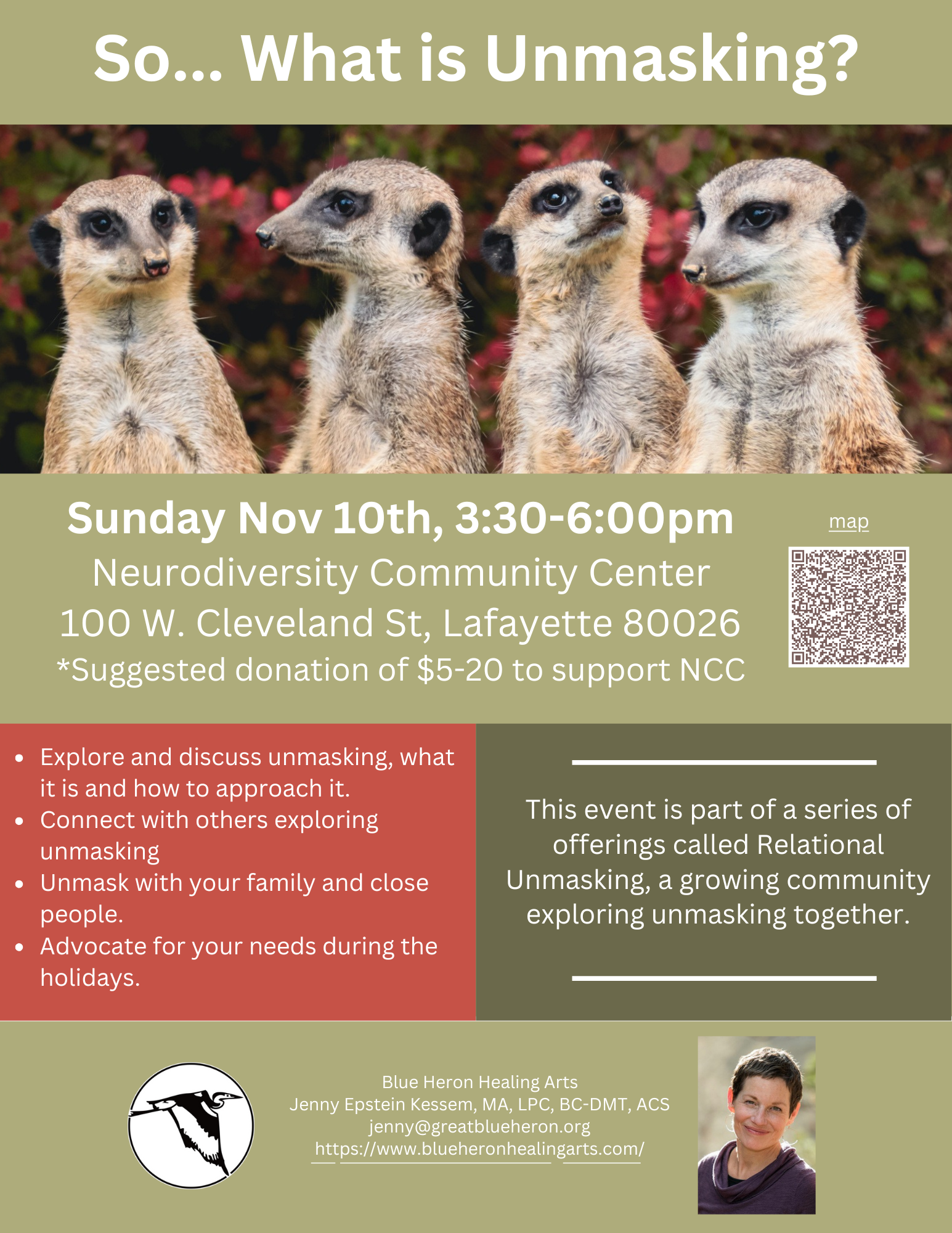What is Unmasking?
/Guest Blog post by Jenny Epstein Kessem, MA, LPC, BC-DMT
In the neurodivergent community, we use the term unmasking to describe a sort of liberation from mainstream expectations of behavior. Another way to think about unmasking is that it’s an experiment with prioritizing authenticity, whatever that may look like for a particular person. In other words, there is no one way to unmask.
We all mask, whether neurodivergent or neurotypical. When I was a child, my mother had a “business voice” she would use when making phone calls to strangers and businesses. She sounded different to me. She had a more limited range of emotional expression, lower and quieter vocal tones, and she said the word “ah” between words instead of “um". This was my mother’s version of masking, or making her voice seem presentable to the outside world. I respected my mother’s “business voice” and thought it was skillful that she could do that. Now I realize that what she was doing was a form of masking. It was also likely exhausting to her, since it was not her normal way of conversing.
For those of us who are neurodivergent, we likely learned early on that our authentic way of being was odd or off-putting to others. We may have discovered rocking back and forth in class as a way to discharge sensory overload from the classroom setting. We may have gotten very excited about a topic of interest and shared with others about it in a long, uninterruptible “info dump”. We may have preferred “soft pants” to pants with buttons or restrictions. Any of these authentic ways of being likely felt good and relieving to us, like a form of taking care of ourselves.
You probably know where this is going. We are social animals, and the need to belong is powerful. Each of the examples I describe above were likely to be met with rejection of some kind. They were not likely to get us the sense of belonging that all humans need. We likely sensed, perhaps with an elevated sensitivity to social interactions, that those choices were not popular with others! So if we had the resources to stop doing them, we likely stuffed that urge away somewhere in the body, and stopped doing it. What happens to a body that distinguishes urges to take care of oneself? In my body, it creates muscle tension and restricted breathing.
At its core, unmasking is about safety. If it is safe to move and act in a way that feels good to me, I will likely do that. For me, unmasking has been freeing, a relief, and joyful. I accept the odd parts of myself and allow them to move. Because I enjoy relative privilege via my various identities (I appear white and female, pass for heterosexual, am educated, and enjoy relative financial stability), it is fairly safe for me to explore unmasking in certain environments. For those who don’t enjoy privilege for various reasons, unmasking may not be as safe. There are very good reasons to mask, including maintaining one’s job and livelihood, and even avoiding a dangerous interaction with the police. Folks experiencing less relative safety may need to mask more for their own well being. However, we can potentially choose where and if to mask, especially when we grow awareness of our automatic masking responses. For example, neurodivergent born-female folks may fawn socially as an avenue toward safety. This is a form of masking.
So how do we create spaces in which we can safely unmask?
And what happens when my unmasking impacts another person in an unwanted way? Should my unmasking be solely for my own liberation, or does my impact on others factor in to the process?
My interest is in this very intersection: what is it like to unmask in a relational way? How can I stay curious about my impact as I unmask and attend to it, while also staying true to myself? How can this inherent tension lead to healthy conflict, conflict in which we stay relational as we negotiate the various, sometimes opposite, needs? Because the answers to these questions are not black and white, built into the Relational Unmasking model is a commitment to relational repair. My unmasking will likely impact others I care about. I want to know about that and take care of it. And I am also interested in being more and more myself in the face of others being more and more themselves in a way that is different than me. The negotiation of that space is Relational Unmasking.
Learn more about Jenny’s work here: https://www.blueheronhealingarts.com/. And check out the upcoming event below!




